By KATIE EUBANKS
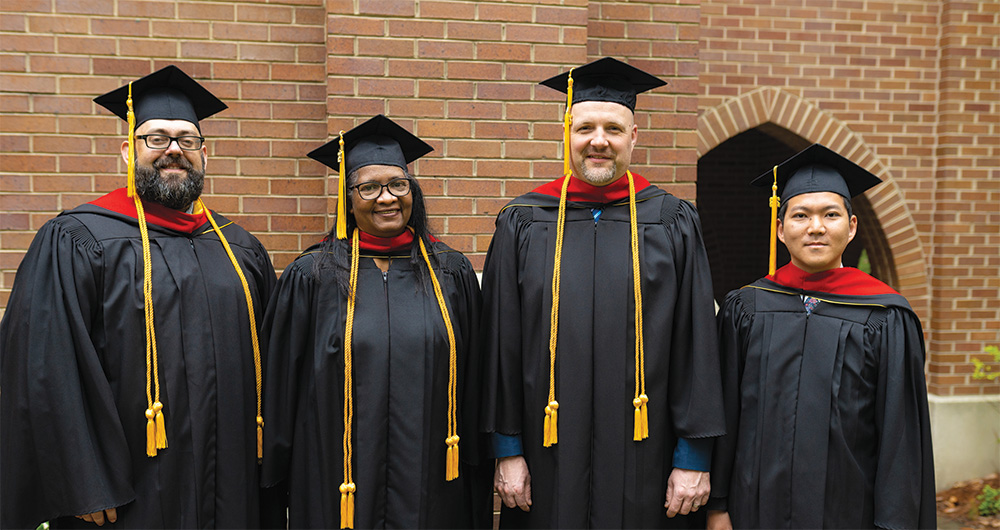
From left: Austin Roberson, Lindsay Williams, Nate Clark, and Akashi Nishigata at their graduation from Wesley Biblical Seminary on Saturday, May 6.
At her seminary graduation last month, Lindsay Williams — an associate pastor in Jackson who was receiving her master’s of divinity — said Ridgeland-based Wesley Biblical Seminary (WBS) had equipped her to “preach the plain truth.” Lindsay was borrowing a phrase from John Wesley, founder of the Methodist movement and the man for whom WBS is named.
Wesley got his “plain truth” from the Bible, and that same biblical truth is what WBS has been committed to for nearly half a century, as the seminary will celebrate 50 years in 2024.
“We have a 50-year history of not compromising as culture has redefined things,” said WBS President Dr. Matt Ayars. “We do not budge on the doctrine of the truthfulness of scripture (as other seminaries have).”
Take that unwavering stance, and couple it with WBS’ small physical footprint — an unassuming one-story building on County Line Road — and one might wonder if the school is struggling in today’s spiritual climate.
Far from it: WBS has seen a 135 percent enrollment increase over the last five years and has no debt, even while offering free tuition in 2021. Instead of taking out loans to maintain a large campus, they hold classes via video, thus reducing overhead and increasing accessibility to students all over the world.
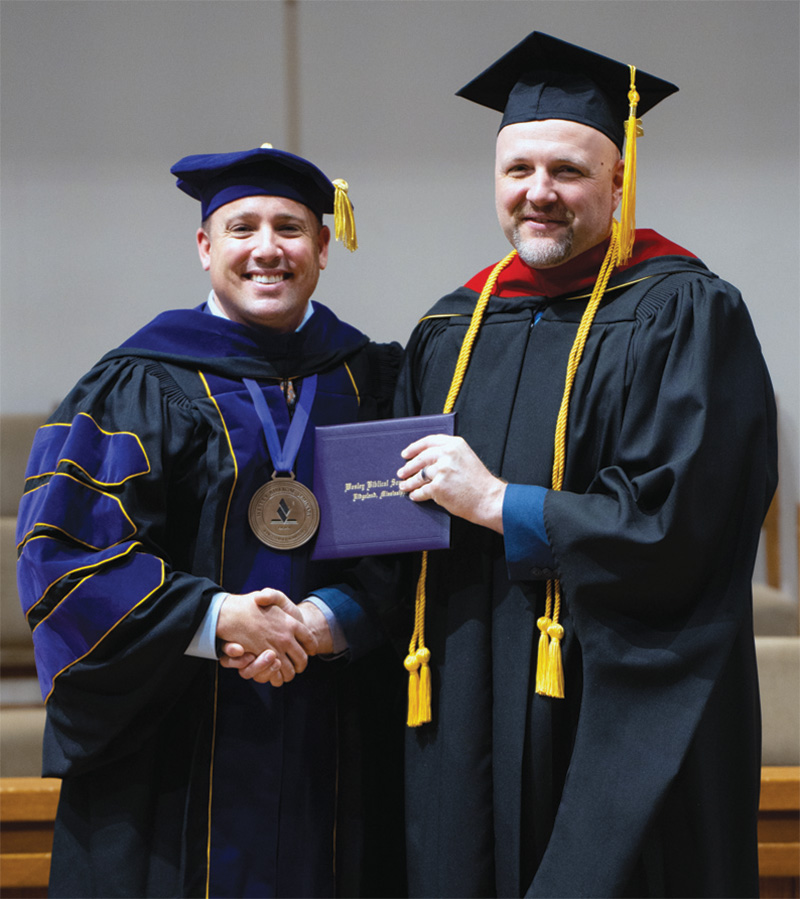
Nate Clark (right) receives his MDiv from Ayars.
Still, the seminary is looking to ensure its stability for decades to come. So, coinciding with its 50th anniversary, WBS is embarking on a fundraising effort called the Steadfast Campaign to raise over $4 million in endowment funds.
“(This will allow us) to greatly expand our influence and reach in the fulfillment of our mission,” said Ayars, which is to “develop trusted leaders for faithful churches” — even as the church landscape shifts.
WBS is one of only six seminaries where ministers can take the courses needed to be ordained in the newly formed Global Methodist Church (GMC), and one of only two such seminaries with a specific course of study tailored to GMC requirements (with no “extra” courses).
The GMC formed on May 1, 2022, in response to theological differences within the United Methodist Church (UMC), and the ripples are still being felt. More than 200 United Methodist churches in Mississippi, and six percent of United Methodist churches worldwide, have voted to disaffiliate from the UMC, though not all have opted to join the GMC.
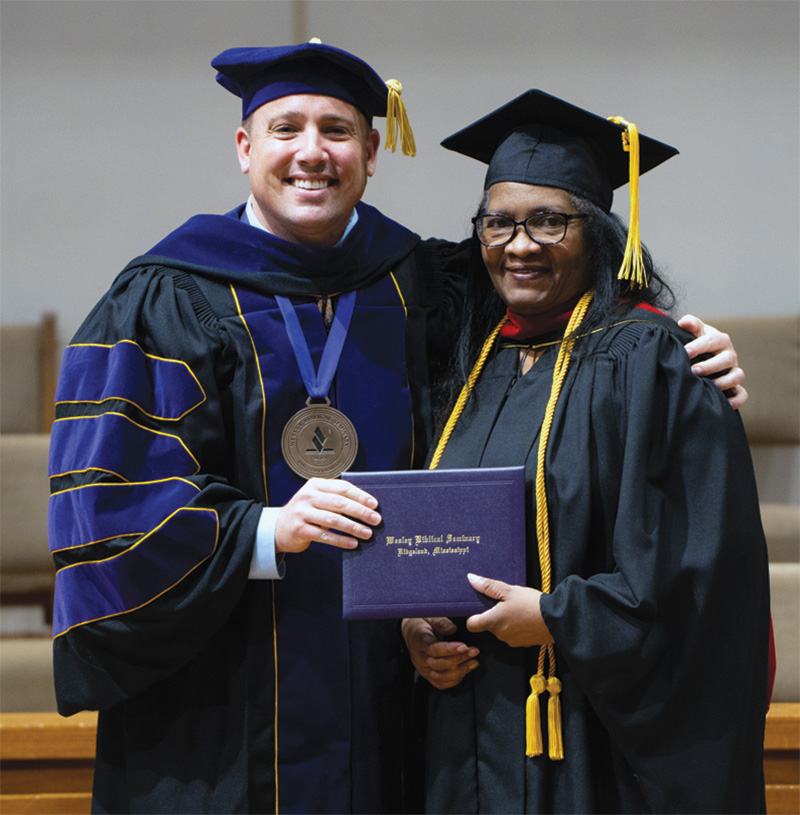
Lindsay Williams (right) receives her master’s of divinity from WBS President Dr. Matt Ayars on Saturday, May 6.
Thousands of Methodist churches will be without pastors because of the split, and the same issues that divided the UMC can cause anxiety as congregations search for new leadership.
“So many churches are looking for a trusted pastor,” Ayars said. “(If the pastor went to another seminary, you might wonder) ‘I don’t know if they believe in gay marriage or not.’”
Most Bible-believing churches see doctrines of sexuality as important enough to split over, partly because traditional marriage between one man and one woman is such a biblically based picture of Christ and the church, and thus the gospel itself, Ayars said.
“There’s a spectrum of progressive Christianity” that he and WBS want to avoid, he said — which often manifests in issues like sexuality, but is rooted in whether the Bible is God’s Word. “It goes all the way from feeling guilty for being a Christian, to universalism,” believing there are ways to God other than faith in Christ, Ayars said.
That drift toward “progressive Christianity” at the cost of biblical doctrine is part of the reason for WBS’ Steadfast Campaign. The donor packet notes:
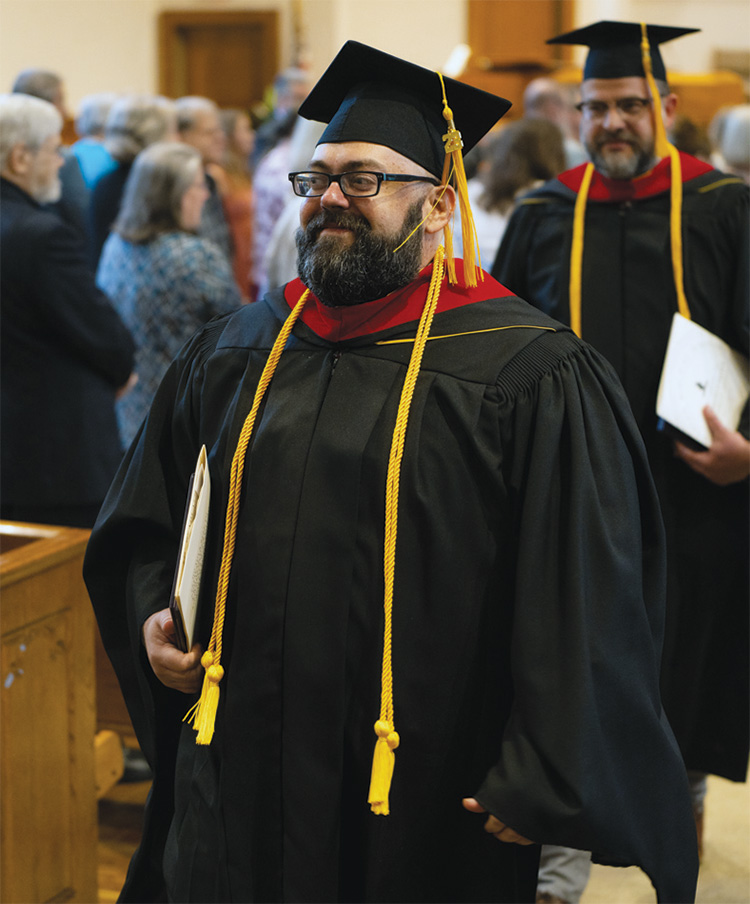
Austin Roberson walks during the WBS graduation ceremony.
“Many believe that the days are numbered for faithful Christian schools to be eligible to receive federally funded financial aid as a consequence of refusing to subscribe to the doctrine of secularism. Losing that funding will result in losing students because students greatly depend on government financial aid.”
WBS was offering free tuition when recent MDiv graduate Nate Clark decided to enroll. A worship leader at a church in Smyrna, Tennessee, Nate heard from a college friend that Wesley was “biblically solid.” He was hesitant about attending classes via Zoom, but “I fell in love with it,” he said.
“You draw really close to everyone. The professors, it’s not just academic. They really pour into you. You get orthodox teaching. I was able to apply it right away, too.”
Similarly, free tuition and the personal connection to his professors and instructors were big factors for Austin Roberson, who also graduated in May with his MDiv. In addition, “(WBS has) really helped me integrate my seminary education and my church work together,” he said.
While Nate and Austin thrived in virtual classes at WBS, a student from much further away was one of few in recent years who actually attended WBS in person.
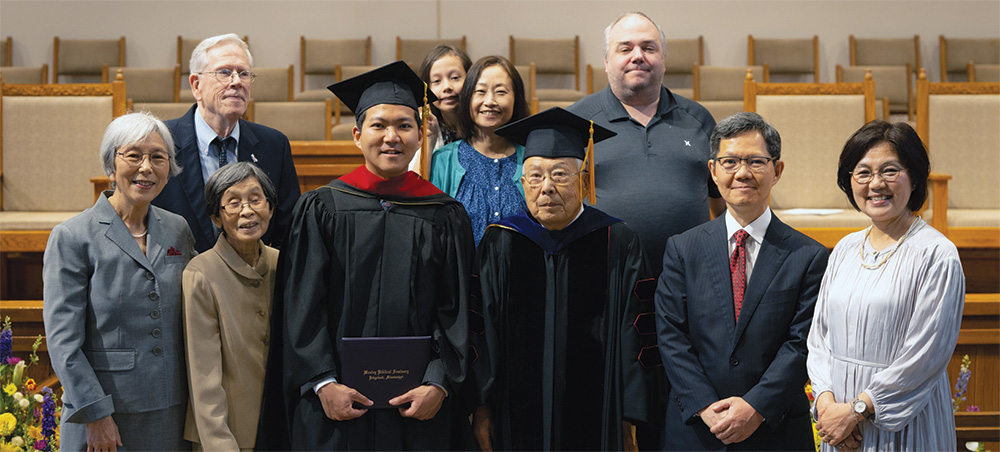
Akashi Nishigata, (center left) with his family and mentor, WBS professor emeritus Dr. Paul Tashiro, center right.
Akashi Nishigata of Tokyo came to classes on campus at WBS for a year and a half after attending Bible college in Kentucky and Ohio. For his final semester at WBS, he returned to Japan and attended online. Regardless of the medium, he said his favorite aspect of WBS was “reading the Bible many times for assignments.” Now that he has his MDiv, Akashi will pursue further studies in Japan.
In the WBS donor packet, Akashi says, “WBS has taught me the importance of a spiritual relationship with God through a devotional life and how to serve others both in and out of the church. It has prepared me to study the Bible well and teach biblically to others, but most importantly, it has taught me to serve others.”
About the endowment and the Steadfast Campaign
“An endowment is a long-term savings account with a large principal,” Ayars said. “It’s sitting in an account, and it’s invested. We can pull down a percentage of the capital gains each year to help with operational expenses. You never spend the principle (but) it ensures ongoing income.”
WBS’ current endowment sits at approximately $3 million. Compare that to larger seminaries, in the tens of millions, or Harvard, which is in the billions. WBS hopes to raise $4 million in mostly endowed funds via the Steadfast Campaign, including $3 million in the next three years.
“One and a half million will be for endowed scholarships, to pay ourselves for all the tuition we’re giving away,” Ayars said. “Two million will be for endowed faculty chairs, one of theological studies and one of biblical studies.”